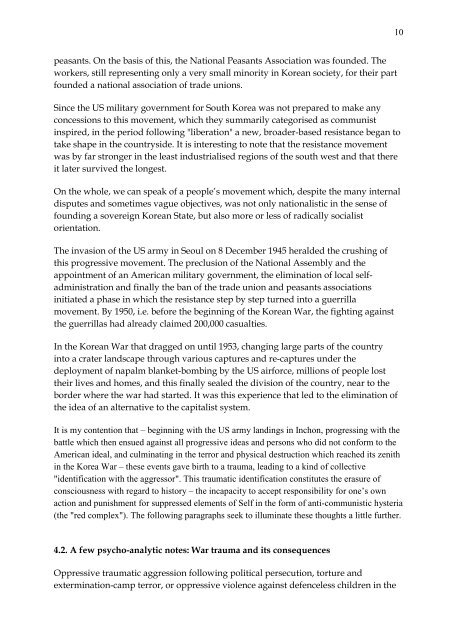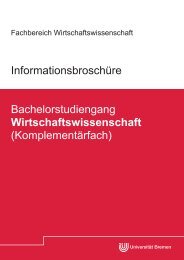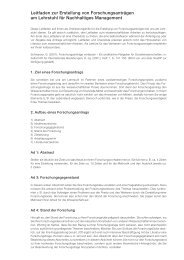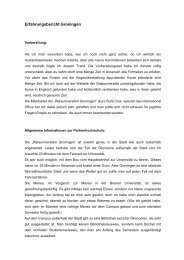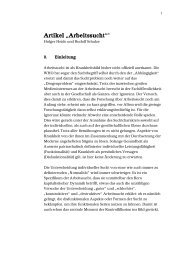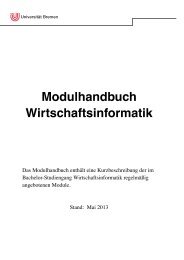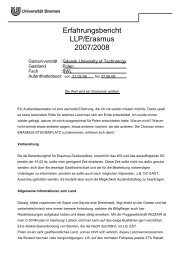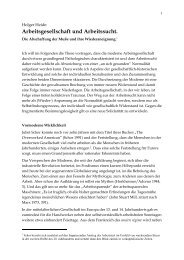Holger Heide Schumpeterian Dynamics in Crisis - Universität Bremen
Holger Heide Schumpeterian Dynamics in Crisis - Universität Bremen
Holger Heide Schumpeterian Dynamics in Crisis - Universität Bremen
You also want an ePaper? Increase the reach of your titles
YUMPU automatically turns print PDFs into web optimized ePapers that Google loves.
10<br />
peasants. On the basis of this, the National Peasants Association was founded. The<br />
workers, still represent<strong>in</strong>g only a very small m<strong>in</strong>ority <strong>in</strong> Korean society, for their part<br />
founded a national association of trade unions.<br />
S<strong>in</strong>ce the US military government for South Korea was not prepared to make any<br />
concessions to this movement, which they summarily categorised as communist<br />
<strong>in</strong>spired, <strong>in</strong> the period follow<strong>in</strong>g "liberation" a new, broader-based resistance began to<br />
take shape <strong>in</strong> the countryside. It is <strong>in</strong>terest<strong>in</strong>g to note that the resistance movement<br />
was by far stronger <strong>in</strong> the least <strong>in</strong>dustrialised regions of the south west and that there<br />
it later survived the longest.<br />
On the whole, we can speak of a people’s movement which, despite the many <strong>in</strong>ternal<br />
disputes and sometimes vague objectives, was not only nationalistic <strong>in</strong> the sense of<br />
found<strong>in</strong>g a sovereign Korean State, but also more or less of radically socialist<br />
orientation.<br />
The <strong>in</strong>vasion of the US army <strong>in</strong> Seoul on 8 December 1945 heralded the crush<strong>in</strong>g of<br />
this progressive movement. The preclusion of the National Assembly and the<br />
appo<strong>in</strong>tment of an American military government, the elim<strong>in</strong>ation of local selfadm<strong>in</strong>istration<br />
and f<strong>in</strong>ally the ban of the trade union and peasants associations<br />
<strong>in</strong>itiated a phase <strong>in</strong> which the resistance step by step turned <strong>in</strong>to a guerrilla<br />
movement. By 1950, i.e. before the beg<strong>in</strong>n<strong>in</strong>g of the Korean War, the fight<strong>in</strong>g aga<strong>in</strong>st<br />
the guerrillas had already claimed 200,000 casualties.<br />
In the Korean War that dragged on until 1953, chang<strong>in</strong>g large parts of the country<br />
<strong>in</strong>to a crater landscape through various captures and re-captures under the<br />
deployment of napalm blanket-bomb<strong>in</strong>g by the US airforce, millions of people lost<br />
their lives and homes, and this f<strong>in</strong>ally sealed the division of the country, near to the<br />
border where the war had started. It was this experience that led to the elim<strong>in</strong>ation of<br />
the idea of an alternative to the capitalist system.<br />
It is my contention that – beg<strong>in</strong>n<strong>in</strong>g with the US army land<strong>in</strong>gs <strong>in</strong> Inchon, progress<strong>in</strong>g with the<br />
battle which then ensued aga<strong>in</strong>st all progressive ideas and persons who did not conform to the<br />
American ideal, and culm<strong>in</strong>at<strong>in</strong>g <strong>in</strong> the terror and physical destruction which reached its zenith<br />
<strong>in</strong> the Korea War – these events gave birth to a trauma, lead<strong>in</strong>g to a k<strong>in</strong>d of collective<br />
"identification with the aggressor". This traumatic identification constitutes the erasure of<br />
consciousness with regard to history – the <strong>in</strong>capacity to accept responsibility for one’s own<br />
action and punishment for suppressed elements of Self <strong>in</strong> the form of anti-communistic hysteria<br />
(the "red complex"). The follow<strong>in</strong>g paragraphs seek to illum<strong>in</strong>ate these thoughts a little further.<br />
4.2. A few psycho-analytic notes: War trauma and its consequences<br />
Oppressive traumatic aggression follow<strong>in</strong>g political persecution, torture and<br />
exterm<strong>in</strong>ation-camp terror, or oppressive violence aga<strong>in</strong>st defenceless children <strong>in</strong> the


